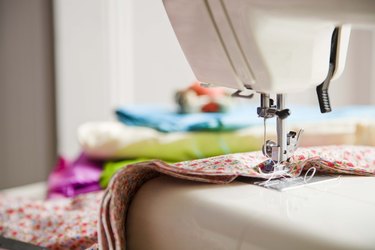Things You'll Need
Sharp scissors
Iron
Ironing board

Often, in the process of sewing garments, seams can become bulky because of excess fabric in the seam allowances. If you do not remedy this situation, the bulk may be visible from the right side of the garment, creating an unattractive appearance. As you make a garment, do layered seams by reducing the seam bulk as you sew. Use different techniques to layer seams to ensure that your garment looks appealing when you finish.
Step 1
Place the garment onto a flat, work surface where you can see and work on the seam allowance to layer it. Position the garment with the seam allowance that will be closest to the body facing up. The side of the seam allowance that will be facing the outside of the garment will be facing down.
Video of the Day
Step 2
Trim the top seam allowance -- the side that will be closest to the body -- along the seam with the scissors. Trim this seam allowance off to leave about 1/4-inch remaining beside the seam line.
Step 3
Leave the other seam allowance -- the side that will be facing the garment -- at full width. Do not trim the other seam allowance.
Step 4
Notch an inner curved seam after layering to reduce bulk and make the curve sit flat. Cut out V-shaped notches through both layers of the seam allowance, stopping the clips about 1/8-inch away from the seam line. Space the Vs about 1 inch apart along the entire curve.
Step 5
Clip an outer, curved seam after layering to reduce bulk and help the curve lay flat. Clip straight cuts through both layers of the seam allowance, stopping the clips about 1/8-inch away from the seam line. These clips differ from the notches for inner curves because you are not creating Vs -- you are making simple clips instead. Space the clips about 1 inch apart along the entire outer curve.
Step 6
Turn the seam allowance to the inside of the garment and position the garment so the right side is facing up. Press the layered seam area to make it look neat.
Video of the Day